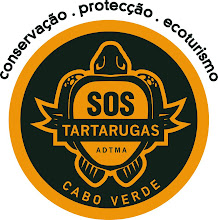 Just back from Mindelo where a seminar brought together representatives from community turtle conservation programmes from five islands for the first time ever. The seminar was organised by INDP (National Fisheries Institute) as part of their initiative PCTM (Projecto da Conservação das Tartarugas Marinhas). The project has been running since 2006 and involves communities from Santo Antão, São Nicolau, São Vicente & Fogo. Participants have various backgrounds but include ex-turtle hunters, fishermen, local government employees and youth groups. All the projects presented results for last year, including number of tracks and nests and hatching success. Many lively debates ensued including ways in which hunting can be prevented, reasons for hatching failure, the need for national coordination between projects and institutions and most importantly, ways in which projects can be financed.
Just back from Mindelo where a seminar brought together representatives from community turtle conservation programmes from five islands for the first time ever. The seminar was organised by INDP (National Fisheries Institute) as part of their initiative PCTM (Projecto da Conservação das Tartarugas Marinhas). The project has been running since 2006 and involves communities from Santo Antão, São Nicolau, São Vicente & Fogo. Participants have various backgrounds but include ex-turtle hunters, fishermen, local government employees and youth groups. All the projects presented results for last year, including number of tracks and nests and hatching success. Many lively debates ensued including ways in which hunting can be prevented, reasons for hatching failure, the need for national coordination between projects and institutions and most importantly, ways in which projects can be financed. Limited funds available from local and national government and lack of tourism in the majority of islands is severely limiting expansion and success of these important local activities.
One of the most important conclusions was the decision to form an NGO that will be responsible for grant applications and gathering funds on behalf of all the projects.
SOS Tartarugas & CVSTN (Capeverdian Sea Turtle Network) will play a part in this programme by providing technical assistance through financing field visits by international and local biologists, supplying equipment and assisting with grant applications.
INDP/PCTM Community project






No comments:
Post a Comment